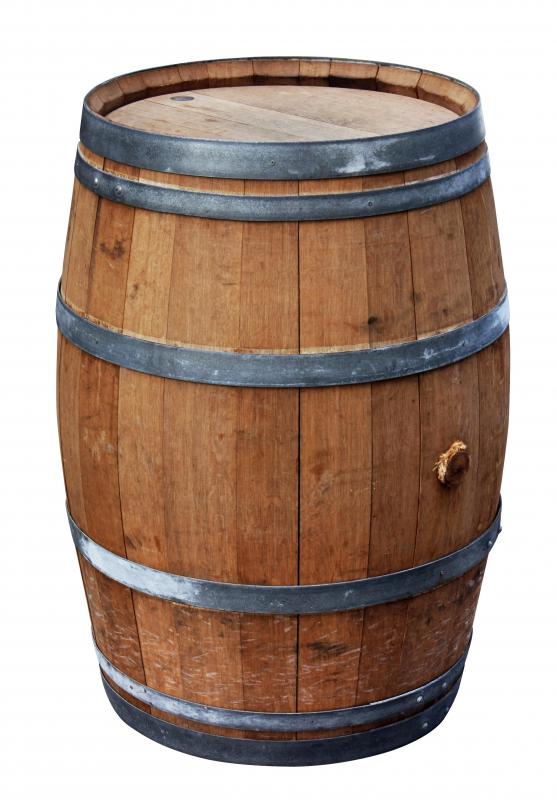At PracticalAdultInsights, we're committed to delivering accurate, trustworthy information. Our expert-authored content is rigorously fact-checked and sourced from credible authorities. Discover how we uphold the highest standards in providing you with reliable knowledge.
What is a Cooper?
A cooper is a craftsman who builds slatted wooden containers such as barrels and butter churns. Building such containers requires a great deal of skill, and traditionally, coopers learned their trade over the course of a long apprenticeship. Coopering was once a vital and widespread profession which, among other purposes, supplied manufacturers with containers in which to store and ship their products. During the 20th century, however, steel containers began to be favored over wooden ones, causing coopering jobs to dwindle.
The containers built by a cooper are known generally as casks. These casks typically consist of thin slats of wood which are arranged vertically to create a container. They usually feature round “head” pieces, also crafted by the cooper, at one or both ends, as well as a number of metal hoops which help the casks retain their shape. Usually, a cask’s widest point is at its middle. Its body may feature a small, round hole into which products such as whiskey can be poured.

Building casks requires a great deal of skill. In addition to providing useful storage containers for a wide range of dry goods, casks have also played an important role in the distillation and transport of alcoholic beverages such as beer, whiskey, and wine. To facilitate liquid storage, the wood used in coopering must be hewn and arranged with extreme precision so that the resulting cask is watertight. Traditionally, a cooper learned this craft over the course of an apprenticeship which could last for five years or more.

While coopering is extremely physically strenuous, historically, the job of a cooper was held in high regard. In fact, the cooper was once so fundamental to the storage and distribution of goods that many companies operated their own on-site cooperages. For instance, Dublin’s Saint James Gate Brewery, maker of Guinness stout, employed in-house coopers up until the second half of the 20th century.

During the 20th century, however, steel casks began to be favored over wooden ones, primarily because the former are more cheaply produced and easily reused than the latter. As a consequence, once-plentiful coopering positions became increasingly rare. In the 21st century, one of the sole remaining strongholds for coopers is the artisanal alcohol industry. For instance, some specialty cognac manufacturers retain the use of a cooper, believing that hand-crafted distillation casks lend a flavor to their product that is unattainable through the use of mass-produced containers made from cheap materials.
AS FEATURED ON:
AS FEATURED ON:













Discussion Comments
@NathanG - Economics does play a role. I'm guessing that barrel making would be a tricky process, since you are creating an essentially round object, and you want to make sure that there are no open slits that air (or liquid) could get through.
Demand plays a role too. If indeed there are more steel barrels in use, the job of the cooper is probably not in demand as the article says, and so even if you wanted to use barrels for your beer, you may choose steel instead.
@everetra - I don’t know how true it is either. I can tell you that some beer manufacturers have rolled out their own line of barrel aged beer. The claims are that the wood contains a lot useful flora and stuff that is important to the fermentation process.
I think that for commercial beers you can buy at the store, those companies are probably less concerned about the nuances of flavor than in their unit costs.
I am guessing maybe the steel barrels factor into the equation because they may be easier and cheaper to produce, or at least last longer. To me the discussion is somewhat academic at some point, like which roller coasters provide a better ride, the old wooden ones or the new kind with steel tracks.
The last paragraph of the article answered a question I had throughout the whole piece. Do you think that wooden casks make beer taste better? I ask because some of the beer commercials like to advertise that their wooden barrels help to provide better taste for the beer.
I don’t know how true that sounds, but it does make sense. The beer would capture some of the flavor, if you will, from the authentic wood barrel and that would add richness to it.
Honestly, I probably wouldn’t be able to tell the difference myself, but I am not exactly a connoisseur of beers and fine wines. People with more finely tuned senses of smell would do a better job than I would, in my opinion.
Post your comments